Your cart is currently empty.
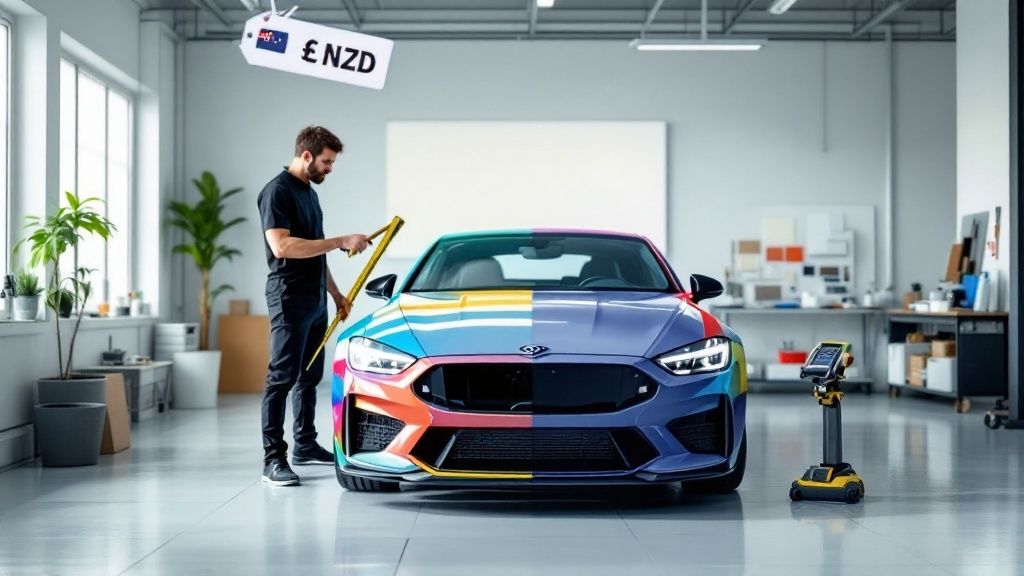
So, what's the bottom line? How much should you budget for a full vehicle wrap here in New Zealand?
For an average-sized car, you're generally looking at a cost between $2,500 and $5,000. If you're wrapping something bigger, like a ute or a commercial van, the price tag naturally goes up, typically landing somewhere in the $5,000 to $10,000 range.
Breaking Down Vehicle Wrap Pricing in NZ
When you're thinking about the cost of a vehicle wrap, it’s less like buying an off-the-shelf product and more like commissioning a custom suit. There's no single price tag because every job is different. The final figure is a combination of the materials used, the time and skill involved in the labour, and the complexity of the design itself.
Think of those initial numbers as a good starting point for your budget. Now, let’s get into the nitty-gritty of what actually influences your final quote.
A General Guide to NZ Wrap Costs
To get a clearer picture of what to expect, it helps to see how pricing changes with the size of the vehicle. Based on recent local pricing insights, a full, professional wrap for a standard passenger car will almost always fall within that $2,500 to $5,000 bracket.
It's just a matter of scale. Larger vehicles like SUVs, utes, and vans have a lot more surface area to cover, which means more vinyl and more hours for the installer. That’s why their costs can climb into the $5,000 to $10,000 range. Of course, if you're only looking at a partial wrap—say, just the bonnet or doors—you’ll be looking at a much lower cost, usually between $500 and $3,000.
To make it even simpler, here’s a quick breakdown of what you can expect to invest for a full wrap on some of the most common vehicles you see on Kiwi roads.
Keep in mind, these figures are a guide for standard colour-change wraps using high-quality vinyl. If you’re after specialty finishes like chrome, matte, or a detailed graphic design, the price will naturally be higher.
Estimated Vehicle Wrap Pricing in NZ by Vehicle Type
| Vehicle Type | Estimated Price Range (NZD) |
|---|---|
| Small Car (e.g., Hatchback) | $2,500 – $4,000 |
| Medium Car (e.g., Sedan) | $3,000 – $5,000 |
| Large Vehicle (e.g., SUV, Ute) | $4,500 – $7,000 |
| Commercial Van | $5,000 – $10,000+ |
This table gives you a solid ballpark figure to work with. But what exactly makes one wrap cost more than another? Next, we'll dive into the specific factors that influence these prices, so you can understand exactly where your money is going and what drives the final cost.
The Key Factors That Determine Your Final Quote
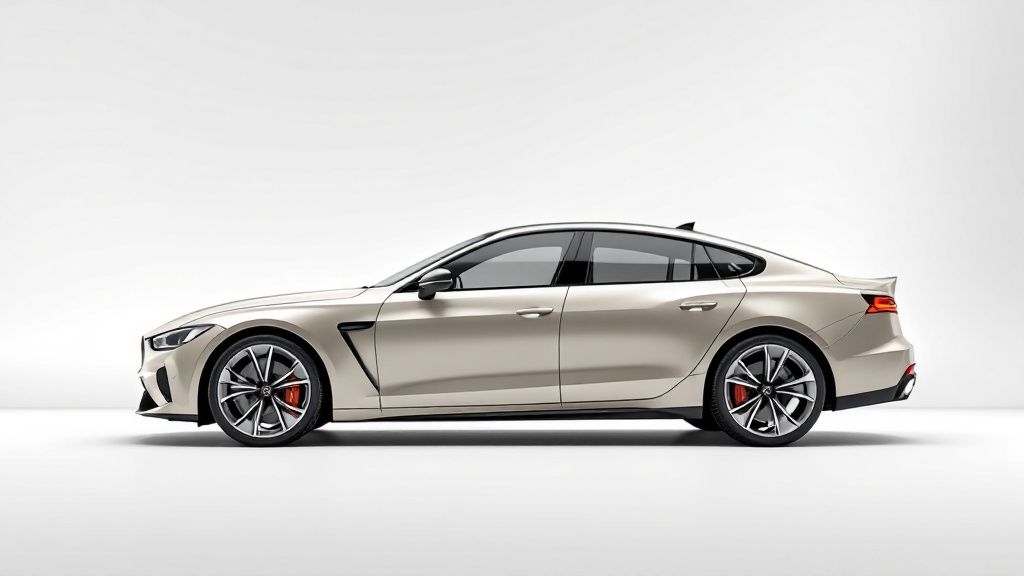
Figuring out what a vehicle wrap will cost is a bit like putting together a puzzle. Several key pieces have to click into place to see the final price. The quote you receive isn’t just a number plucked from thin air; it’s a careful calculation based on a few critical variables that every professional shop will weigh up.
Once you get a handle on these factors, you’ll understand exactly where your money is going. It also puts you in a much better position to make smart choices that fit your budget and what you’re trying to achieve. Let’s break down each piece of the puzzle.
Vehicle Size and Complexity
This is the most obvious starting point. A small hatchback has a lot less surface area than a big commercial van, so it’s naturally going to need less vinyl and less time to install. Simple.
But it's not just about the sheer size. The complexity of the vehicle’s body is a huge factor. Think about it: a van with big, flat, boxy sides is a dream to wrap compared to a sports car full of deep recesses, aggressive curves, and intricate bumpers. Those tricky areas demand a much higher level of skill and far more time to get the vinyl to lay perfectly without any lifts, bubbles, or wrinkles.
Vinyl Material and Finish
The actual vinyl you pick plays a massive part in the final cost. It's a bit like choosing the fabric for a suit—a standard wool is going to be more affordable than a premium silk. The same logic applies here.
Your options for finish can vary wildly in both look and price:
- Standard Gloss or Matte: These are your bread and butter. They’re the most common and cost-effective choices, giving you a clean, paint-like finish.
- Satin Finishes: A really popular middle-ground option. It sits beautifully between gloss and matte, offering a subtle, premium-looking sheen for a moderate price.
- Specialty Finishes: This is where things get exciting—and expensive. We’re talking about textured carbon fibre, brushed metals, mesmerising colour-shifting films, and dazzling chrome. These materials cost more to produce and often require special techniques to install, which bumps up the price.
A specialty chrome or colour-flip vinyl can easily cost two to three times more than a standard gloss film. That difference in material alone can add thousands to the final quote, so it pays to choose your finish carefully if you're working to a budget.
Design Complexity and Coverage
The ambition of your project is another major cost driver. A straightforward, single-colour change wrap will always be less expensive than a fully printed graphic loaded with intricate logos, custom text, and high-resolution images.
A complex design doesn't just appear out of nowhere. It requires hours of a graphic designer's time to create the artwork and make sure it flows perfectly with every contour of your specific vehicle. On top of that, the process of printing and laminating custom graphics adds to the material bill. Finding cost-effective design solutions can make a huge difference when you’re trying to keep the final cost down.
You also need to decide between a full wrap (covering every bit of painted surface) and a partial wrap (just covering specific areas like the bonnet, roof, or doors). This choice will dramatically change your quote. A partial wrap is a fantastic, budget-friendly way to get a custom look because it uses less material and takes far less time to install.
Condition of the Original Paint
Finally, something people often forget: the state of your car’s paintwork before the wrap goes on. Vinyl needs a perfectly smooth, clean surface to stick to properly. If your paint is flaking, the clear coat is peeling, or you have deep scratches, rust spots, and dents, those problems have to be sorted out first.
A good installer won't just cover up these issues—that's a recipe for a terrible finish and a wrap that will start to fail in no time. Any bodywork or paint correction needed beforehand is an extra cost you’ll need to factor into your overall budget.
Decoding Your Quote: The Cost of Materials vs. Labour
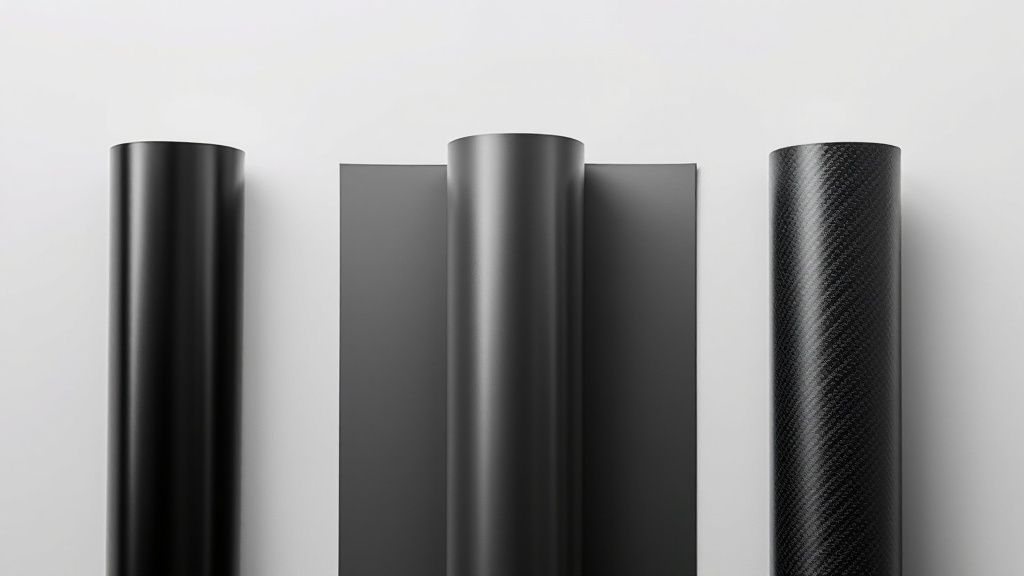
When you get a quote for a vehicle wrap, it's easy to look at the bottom line and assume the biggest chunk of that cost is the roll of vinyl itself. While premium materials certainly aren’t cheap, the real story behind vehicle wrap pricing often catches people by surprise. The largest—and most crucial—part of your investment is almost always the skilled labour needed for a flawless installation.
Think of it like getting a bespoke suit made. You're not just paying for the fabric; you're paying for the tailor's expertise to cut, stitch, and fit it perfectly to your body. A vehicle wrap is no different. The installer’s skill is what transforms a flat sheet of vinyl into a stunning, seamless second skin for your car.
That expertise is what stops bubbles, wrinkles, and peeling edges from ever appearing, ensuring your wrap looks incredible and lasts for years to come.
The True Cost of Materials
The vinyl film is obviously the star of the show, but it typically only makes up a fraction of the total quote. Here in New Zealand, the material itself can range anywhere from NZD $5 to $15 per square foot, depending on the brand, colour, and finish you're after.
But that price covers more than just the vinyl. It also includes the essential extras that make for a professional, long-lasting job:
- High-Quality Vinyl Film: Sourced from trusted brands known for their durability and performance.
- Protective Overlaminate: A vital clear layer that shields printed graphics from UV rays and minor scratches.
- Adhesives and Primers: Specialised products that ensure the vinyl sticks perfectly to tricky curves, deep recesses, and sharp edges.
While these materials are vital, their cost is relatively fixed. The real variable, and where the price can change significantly, comes down to the time and skill required to apply them.
Why Skilled Labour Is Your Biggest Investment
The installation is where the magic really happens. It’s an art form that demands incredible patience, a steady hand, and years of hands-on experience. A professional installer has to meticulously clean and prep every single surface, often disassembling parts like door handles, mirrors, and badges to ensure a clean finish. Then comes the careful process of stretching and applying the vinyl around every complex curve and contour.
A detailed analysis of car wrap costs shows that while materials are a factor, the majority of the expense comes from labour. Installation charges in NZ can range from $3 to $19 per square foot, with prices for luxury cars sometimes climbing from $10,000 to $18,000 due to the higher level of care required. You can learn more about the complete cost breakdown for vehicle wraps in New Zealand.
This meticulous work takes time—a lot of it. A full wrap on a standard car can easily take a skilled technician anywhere from 20 to 30 hours to complete. For larger vehicles like vans or more complex sports cars, this can quickly stretch to 40 hours or more.
Ultimately, you're paying for an expert's time and talent. This investment in professional labour is what guarantees a bubble-free, long-lasting finish that protects your vehicle and makes your brand look its absolute best.
Full Wraps vs Partial Wraps: Choosing Your Coverage
One of the biggest decisions you'll make is how much of your vehicle you actually want to wrap. This is where your vision meets your budget, and it directly shapes the final cost and look of your project. You don’t always need to cover every last centimetre of paint to make a massive impact.
Sometimes, a cleverly placed partial wrap can be just as stunning as a full transformation. It really boils down to your end goal. Are you after a complete colour change? A few stylish accents? Or a rolling billboard for your business? Each of these goals points to a different level of coverage.
Full Colour-Change Wraps
A full wrap is the go-to choice when you want a total makeover. Just like it sounds, it involves covering every visible painted panel of your vehicle with vinyl. This is your best bet if you're dreaming of a completely new colour, giving you that fresh-from-the-factory look without the permanence or expense of a respray.
This approach delivers the most dramatic visual punch, completely reinventing your car’s character. It also offers the ultimate protection for your original paint, shielding it from stone chips, scratches, and UV rays, which is great for maintaining the car's resale value. Naturally, because it uses the most material and takes the most time, a full wrap sits at the top end of the price scale.
The image below gives you a clear idea of how the costs break down for different wrap types.
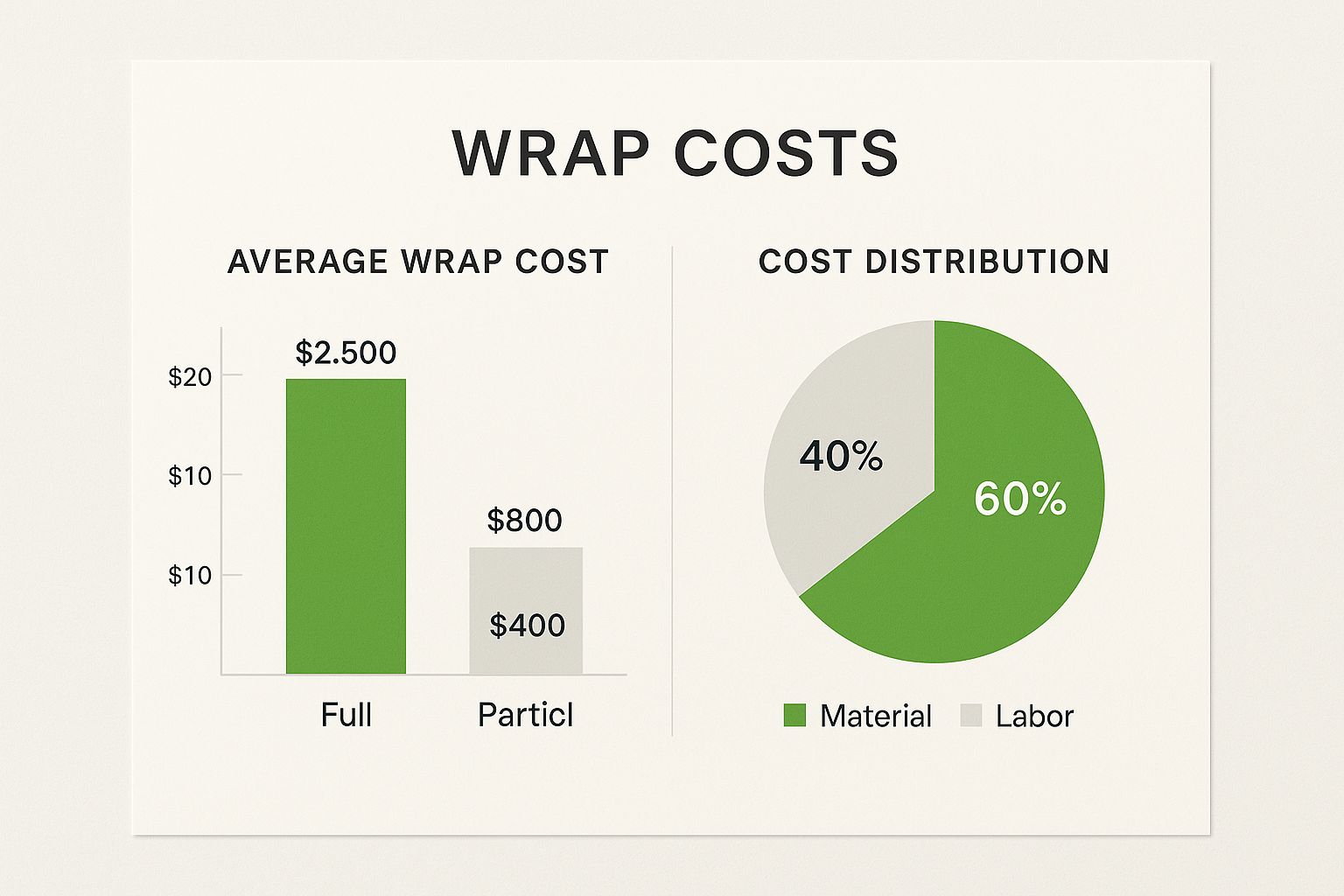
As you can see, while a full wrap is a significant investment, a large chunk of that cost goes directly into the premium, long-lasting materials needed for a flawless finish.
Partial Wraps and Commercial Graphics
Partial wraps are a brilliant, cost-effective way to get a custom look without committing to a full-body project. Think about wrapping just the bonnet, roof, or wing mirrors in a contrasting finish like gloss black or carbon fibre. These small accents can completely change the vibe of your vehicle for a fraction of the cost.
For business owners, partial wraps and custom graphics are marketing gold. Instead of wrapping the whole van or ute, you can strategically place your logo, phone number, and services on the doors, sides, or rear. This turns your vehicle into a highly effective mobile advertisement. In fact, a single wrapped vehicle can generate up to 70,000 visual impressions a day, making it an incredibly powerful tool for building brand awareness around town.
Customisation isn't just about colour, either. While you're thinking about vinyl, some owners also add films for extra protection and safety. A good car window security film guide can walk you through options that add another layer of security to your vehicle.
Wrap Coverage Options Compared
To make the choice easier, let's break down the main options side-by-side. Each type of wrap serves a different purpose and comes with its own price tag.
| Wrap Type | Typical Use Case | Average Cost (NZD) | Key Benefit |
|---|---|---|---|
| Full Wrap | Complete colour change, maximum paint protection, fleet branding. | $4,500 - $8,000+ | Total transformation and full paint preservation. |
| Partial Wrap | Accents (roof, bonnet, mirrors), two-tone effects, budget-friendly custom look. | $750 - $2,500 | High-impact style at a much lower cost. |
| Commercial Graphics | Business branding, logos, contact info, and promotional advertising. | $500 - $3,500+ | Cost-effective mobile advertising with high ROI. |
Ultimately, the right choice depends on what you want to achieve. A full wrap offers a complete reinvention, while partials and commercial graphics provide targeted impact, proving that you don't need to cover everything to turn heads.
How to Get a Truly Accurate Vehicle Wrap Quote
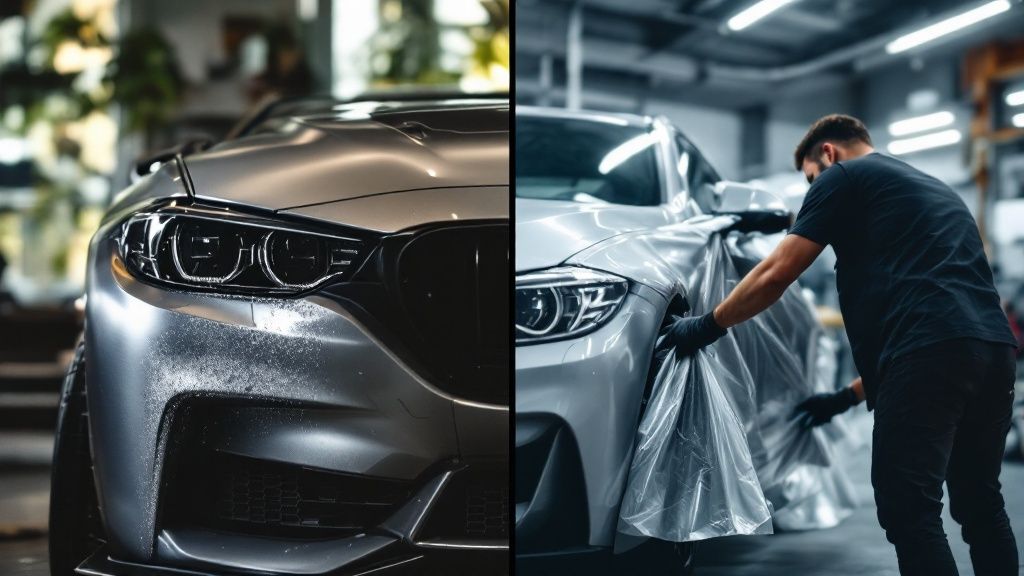
Getting a solid quote is easily the most critical part of planning your vehicle wrap. If you send a vague request, you'll get a vague, ballpark price back. But if you walk in armed with clear, detailed information, a good wrap shop can give you a precise figure, saving you from any nasty surprises when the final bill comes.
Think of it like this: you wouldn't ask a builder, "how much for an extension?" without showing them the architectural plans. The more detail you can provide right from the start, the more accurate their estimate will be. This little bit of prep work also puts you in the driver's seat, allowing you to compare quotes from different installers on a true apples-to-apples basis.
What to Provide Your Installer
To get the ball rolling, you’ll need to give your potential wrap shop some key details about your vehicle and what you have in mind. Having this info ready not only gets you a quote faster but also signals that you’re a serious customer who values their time.
Here’s what they’ll need to know:
- Vehicle Details: The exact make, model, and year are crucial. A 2023 Ford Ranger has completely different body lines and challenges than a 2015 model, and the quote will reflect that.
- Current Paint Condition: Be upfront and honest about any scratches, dings, or peeling clear coat. These imperfections absolutely have to be fixed before the vinyl goes on, and that will factor into the final cost.
- Desired Coverage: Be specific. Are you after a full, colour-change wrap? Or maybe just a partial wrap covering the roof and bonnet? Or are you looking for commercial graphics on the doors and back?
- Vinyl Finish: Let them know the look you're going for. A standard gloss black will be priced very differently from a premium matte metallic or a textured carbon fibre finish.
- Design Ideas: If you already have a design mocked up or even just a folder of ideas, share it! This helps the shop estimate how much design time they might need to budget for.
An accurate quote is built on clarity. The more specific you are about your vehicle and your vision, the fewer variables the installer has to guess, leading to a quote you can actually rely on.
Key Questions to Ask the Wrap Shop
Getting a price isn't a one-way street. This is your opportunity to interview the installer and make sure your investment is in good hands. A professional shop will welcome these questions.
Before you commit to anyone, make sure you ask:
- What vinyl brands do you use? You want to hear names like 3M, Avery Dennison, or Oracal. Reputable shops are proud of the premium materials they use.
- What is your installation warranty? Get the specifics. What does their guarantee cover – peeling, lifting, bubbling? And for how long?
- What is the expected lifespan of the wrap? A pro will give you a realistic timeframe, not an over-the-top promise. This depends heavily on the vinyl and our local NZ conditions.
- Is design time included in the quote? Always clarify this. You need to know if there are separate charges for creating the artwork and for any revisions you might request.
- Can I see your portfolio? Nothing speaks louder than their past work. Looking at vehicles they've actually wrapped is the single best way to judge the quality you can expect.
Still Have Questions About Vehicle Wrap Pricing?
Alright, let's tackle some of the common questions that pop up when people are trying to weigh up the cost of a vehicle wrap. Getting these last few details ironed out can give you the confidence you need to take the next step, knowing exactly what you’re paying for.
Think of this as the final checklist before you commit.
Is It Cheaper to Wrap a Car or Paint It in NZ?
In almost every case, yes. A high-quality vehicle wrap is significantly more cost-effective than a paint job of the same calibre. A professional respray can easily run you anywhere from NZD $7,000 to $15,000, and sometimes even more for custom colours or fancy finishes.
On the other hand, a top-tier full wrap that delivers a similar visual punch usually lands in the $3,500 to $7,000 range. The real kicker, though? A wrap isn't permanent. It actually shields your car's factory paint from stone chips, UV rays, and general wear and tear, which is fantastic for preserving its resale value. A new coat of paint just can't offer that same protection.
A vehicle wrap is more than just a new look; it's a protective shield. By preserving the original paint, it holds onto the car's value, which makes the upfront cost a smart long-term investment.
How Does a Wrap’s Lifespan Factor into Its Value?
The durability of a wrap is where you really see its value shine. A professionally installed wrap using premium vinyl from industry leaders like 3M or Avery Dennison should look great for five to seven years. That longevity is a huge part of the deal.
When your wrap lasts longer, you're getting more bang for your buck—more years of turning heads and protecting your paint for that initial outlay. Cheaper materials might save you a few dollars at the start, but they often start to fade, crack, or peel within a year or two. This makes a professional job with quality materials the much smarter choice over the long haul.
Are There Any Hidden Costs I Should Watch Out For?
Any good wrap shop in New Zealand will be upfront with their pricing, but extra costs can creep in depending on your car's current state.
- Paint Condition: If your car has peeling clear coat, deep scratches, or dings and dents, that all needs to be sorted before the vinyl goes on. This bodywork is a separate cost.
- Complex Extras: Want the inside of your door jambs wrapped? Or maybe some interior trim or a tricky aftermarket body kit? These custom touches require more material and a lot more skilled labour, which will add to the final bill.
The best way to avoid surprises is to ask for a fully itemised quote. Make sure it breaks down every part of the job, so you know exactly where your money is going before work begins.
At SONI DESIGN, we're all about clear communication and incredible results. Let's work together to create a high-quality wrap that not only looks amazing but also protects your vehicle for years to come. Get in touch with us at SONI DESIGN.
Leave a Comment
Stay home & get your daily
needs from our shop
Start You'r Daily Shopping with Nest Mart
Best prices & offers
Orders $50 or more
Free delivery
24/7 amazing services
Great daily deal
When you sign up
Wide assortment
Mega Discounts
Easy returns
Within 30 days
